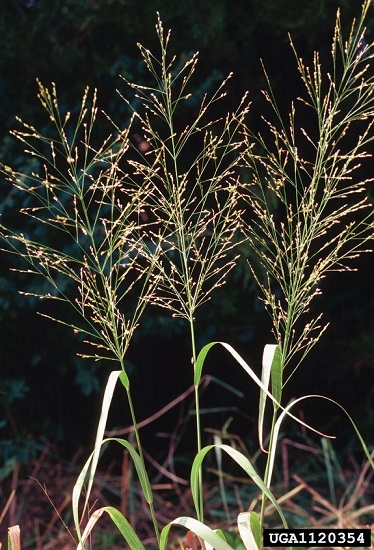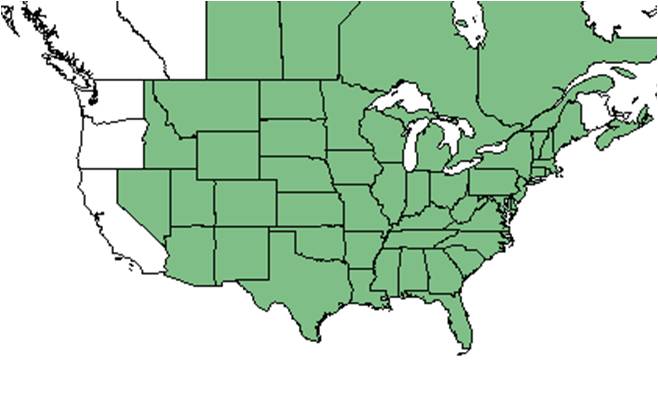Difference between revisions of "Panicum virgatum"
Lsandstrum (talk | contribs) (→Ecology) |
Juliec4335 (talk | contribs) (→Habitat) |
||
| Line 35: | Line 35: | ||
''P. virgatum'' responds negatively to soil disturbance by agriculture in Southwest Georgia.<ref>Kirkman, L.K., K.L. Coffey, R.J. Mitchell, and E.B. Moser. Ground Cover Recovery Patterns and Life-History Traits: Implications for Restoration Obstacles and Opportunities in a Species-Rich Savanna. (2004). Journal of Ecology 92(3):409-421.</ref> | ''P. virgatum'' responds negatively to soil disturbance by agriculture in Southwest Georgia.<ref>Kirkman, L.K., K.L. Coffey, R.J. Mitchell, and E.B. Moser. Ground Cover Recovery Patterns and Life-History Traits: Implications for Restoration Obstacles and Opportunities in a Species-Rich Savanna. (2004). Journal of Ecology 92(3):409-421.</ref> | ||
<!--Natural communities, human disturbed habitats, topography, hydrology, soils, light, fire regime requirements for removal of competition, etc.--> | <!--Natural communities, human disturbed habitats, topography, hydrology, soils, light, fire regime requirements for removal of competition, etc.--> | ||
| + | |||
| + | ''Panicum virgatum'' var. ''virgatum'' is frequent and abundant in the Calcareous Savannas community type as described in Carr et al. (2010).<ref>Carr, S.C., K.M. Robertson, and R.K. Peet. 2010. A vegetation classification of fire-dependent pinelands of Florida. Castanea 75:153-189.</ref> | ||
| + | |||
===Phenology=== <!--Timing off flowering, fruiting, seed dispersal, and environmental triggers. Cite PanFlora website if appropriate: http://www.gilnelson.com/PanFlora/ --> | ===Phenology=== <!--Timing off flowering, fruiting, seed dispersal, and environmental triggers. Cite PanFlora website if appropriate: http://www.gilnelson.com/PanFlora/ --> | ||
''P. virgatum'' has been observed flowering in July and September.<ref>Nelson, G. [http://www.gilnelson.com/ PanFlora]: Plant data for the eastern United States with emphasis on the Southeastern Coastal Plains, Florida, and the Florida Panhandle. www.gilnelson.com/PanFlora/ Accessed: 12 DEC 2016</ref> | ''P. virgatum'' has been observed flowering in July and September.<ref>Nelson, G. [http://www.gilnelson.com/ PanFlora]: Plant data for the eastern United States with emphasis on the Southeastern Coastal Plains, Florida, and the Florida Panhandle. www.gilnelson.com/PanFlora/ Accessed: 12 DEC 2016</ref> | ||
Revision as of 21:57, 24 July 2020
| Panicum virgatum | |
|---|---|

| |
| Photo by James H. Miller & Ted Bodner, Southern Weed Science Society, Bugwood.org | |
| Scientific classification | |
| Kingdom: | Plantae |
| Division: | Tracheophyta- Vascular plants |
| Class: | Lilianae - Monocotyledons |
| Order: | Poales |
| Family: | Poaceae |
| Genus: | Panicum |
| Species: | P. virgatum |
| Binomial name | |
| Panicum virgatum L. | |

| |
| Natural range of Panicum virgatum from USDA NRCS Plants Database. | |
Common names: Switchgrass; Old switch panicgrass
Contents
Taxonomic notes
Synonym: Panicum virgatum Linnaeus var. virgatum
Varieties: Panicum virgatum Linnaeus var. cubense Grisebach; Panicum virgatum Linnaeus var. spissum Linder
Description
"Spikelets usually in panicles, round or nearly so in cross section, 2-flowered, terminal fertile, basal sterile, neutral or staminate. First glume usually present, 2nd glume and sterile lemma similar; fertile lemma and palea indurate without hyaline margins. Taxonomically our most difficult and least understood genus of grasses, more than 100 species and varieties are ascribed to the Carolinas by some authors. Note general descriptions for species groups (e.g., 1-4, 5-8, 9-13, and 26-62)." [1]
"Elongate, rhizomatous perennial; culms 5-15 dm tall. Blades to 5 dm long, 1.5-8 mm wide, sparsely pilose above basally; sheaths occasionally pubescent, margins occasionally densely ciliate; ligules ciliate or lacerate, 1.5 mm long. Panicle open, 12-50 cm long, 6-20 cm broad. Spikelets 2.8-4.2 mm long. Frist glume 5-9 nerved, acute to keeled-cuspidate, 1.4-3.0 mm long, 2nd glume and sterile lemma 7-9 nerved, acute to cuspidate, 2.8-4.2 mm long, sterile palea2-2.6 mm long; fertile lemma 2-2.6 mm long. Grain grayish, 1-2 mm long." [1]
Distribution
Ecology
Habitat
P. virgatum responds negatively to soil disturbance by agriculture in Southwest Georgia.[2]
Panicum virgatum var. virgatum is frequent and abundant in the Calcareous Savannas community type as described in Carr et al. (2010).[3]
Phenology
P. virgatum has been observed flowering in July and September.[4]
Seed dispersal
This species is thought to be dispersed by gravity. [5]
Conservation and management
Cultivation and restoration
Photo Gallery
References and notes
- ↑ 1.0 1.1 Radford, Albert E., Harry E. Ahles, and C. Ritchie Bell. Manual of the Vascular Flora of the Carolinas. 1964, 1968. The University of North Carolina Press. 145. Print.
- ↑ Kirkman, L.K., K.L. Coffey, R.J. Mitchell, and E.B. Moser. Ground Cover Recovery Patterns and Life-History Traits: Implications for Restoration Obstacles and Opportunities in a Species-Rich Savanna. (2004). Journal of Ecology 92(3):409-421.
- ↑ Carr, S.C., K.M. Robertson, and R.K. Peet. 2010. A vegetation classification of fire-dependent pinelands of Florida. Castanea 75:153-189.
- ↑ Nelson, G. PanFlora: Plant data for the eastern United States with emphasis on the Southeastern Coastal Plains, Florida, and the Florida Panhandle. www.gilnelson.com/PanFlora/ Accessed: 12 DEC 2016
- ↑ Kirkman, L. Katherine. Unpublished database of seed dispersal mode of plants found in Coastal Plain longleaf pine-grasslands of the Jones Ecological Research Center, Georgia.